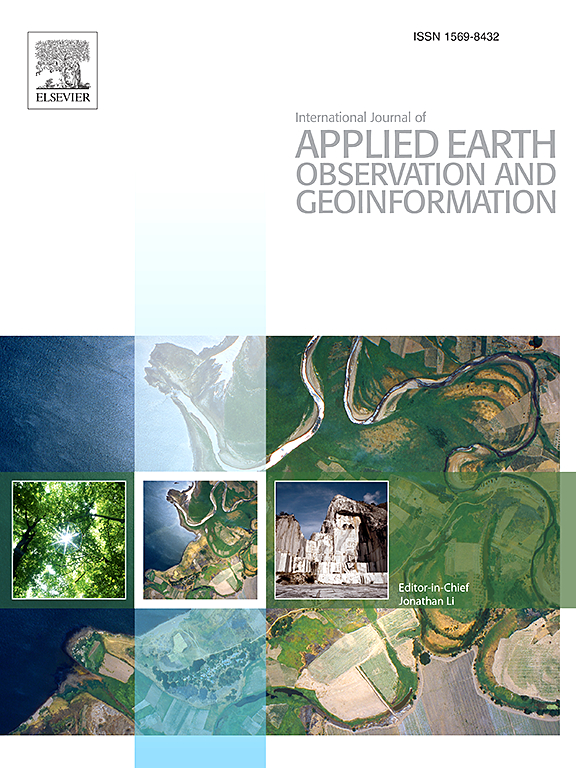Plantation forests driven spatiotemporal vegetation trends and its interplay with climate variables in the Northwestern Highlands of Ethiopia
IF 7.6
Q1 REMOTE SENSING
International journal of applied earth observation and geoinformation : ITC journal
Pub Date : 2025-02-17
DOI:10.1016/j.jag.2025.104411
引用次数: 0
Abstract
Plantation forests have been increasingly established in Fagita Lekoma District, located in the Northwestern Highlands of Ethiopia, over the past two decades. However, their interaction with climate variables remains largely unexplored. This study aims to investigate the spatiotemporal dynamics of plantation forests driven vegetation changes and their relationship with climate variables in the district from 2000 to 2020. Moderate Resolution Imaging Spectroradiometer (MODIS) data and Enhanced National Climate Services (ENACTS) data of the study area were processed for 21 years to examine trends using the Mann-Kendall test and Sen’s slope estimator, employing R 4.3 programming software. Concurrently, various climatic data, including evapotranspiration (ET), land surface temperature (LST), and rainfall, were processed, and analysed to explore the relationships between vegetation change and climate variability in the district during the study period. Increasing trends of Normalized Difference Vegetation Index (NDVI) greenness in the district were highlighted, with mean annual NDVI rising from 0.53 to 0.64, showing an average trend of 0.0036 year−1. This increase is primarily attributed to the widespread establishment of plantation forests across the district. The largest increase was revealed in ET, with a rate of 12.27 kg/m2 year−1. Conversely, LST and rainfall exhibited insignificant decreasing trends, with a rate of − 0.15 °C year−1 and − 10.54 mm year−1, respectively. Furthermore, a statistically significant positive correlation between NDVI and ET was observed, underscoring the critical role of vegetation in maintaining water availability. The negative correlation between NDVI and LST suggests that increased vegetation cover contributes to land surface temperature cooling. Additionally, the statistically insignificant negative correlation between NDVI and rainfall emphasizes the influence of land use change and human intervention on vegetation productivity. Overall, this study highlights the significance of long-term satellite observations in assessing the intricate interplays between vegetation dynamics driven by plantation forestry and climate variables at a local scale. The findings emphasize the role of plantation forests in enhancing vegetation greenness, improving water regulation, and mitigating land surface temperature warming, providing critical insights for sustainable land management and policy interventions in similar regions.
求助全文
约1分钟内获得全文
求助全文
来源期刊

International journal of applied earth observation and geoinformation : ITC journal
Global and Planetary Change, Management, Monitoring, Policy and Law, Earth-Surface Processes, Computers in Earth Sciences
CiteScore
12.00
自引率
0.00%
发文量
0
审稿时长
77 days
期刊介绍:
The International Journal of Applied Earth Observation and Geoinformation publishes original papers that utilize earth observation data for natural resource and environmental inventory and management. These data primarily originate from remote sensing platforms, including satellites and aircraft, supplemented by surface and subsurface measurements. Addressing natural resources such as forests, agricultural land, soils, and water, as well as environmental concerns like biodiversity, land degradation, and hazards, the journal explores conceptual and data-driven approaches. It covers geoinformation themes like capturing, databasing, visualization, interpretation, data quality, and spatial uncertainty.
 求助内容:
求助内容: 应助结果提醒方式:
应助结果提醒方式:


